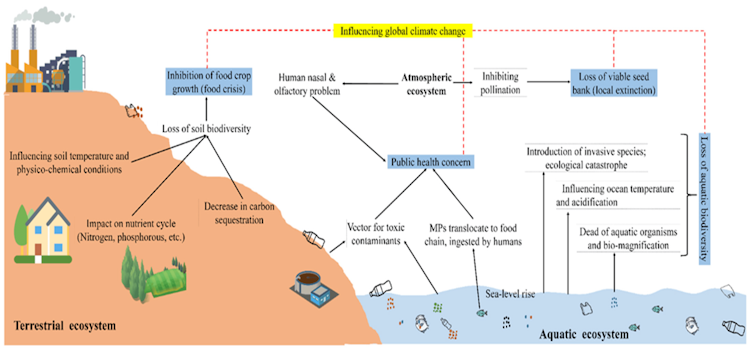
Waste and climate change are intimately related two of the greatest environmental issues today. These underappreciated flows of material processing carry important implications for global climate warming – good, bad and indifferent.
The waste sector significantly contributes to climate dynamics (from methane emissions in landfills upon decomposition all the way to a carbon footprint of incineration). This is a challenge that must be tackled holistically by adoption of wastes reduction initiatives, practices in waste management processes are improved as well end use applications through promotion of circular economy.
Waste-Related Greenhouse Gas Emissions
Waste is responsible for releasing gas emissions that warm the Earth, including methane (CH4) and carbon dioxide (CO2). Methane, a greenhouse gas that has over 25 times the global warming potential of carbon dioxide (CO2) during its first one hundred years in the atmosphere, is emitted primarily from anaerobic decay of organic waste within landfills.
According to information from the Environmental Protection Agency (EPA), landfills are one of largest human-related sources of methane emissions in most countries around the world, and about 15% of US methane releases come from municipal solid waste landfill. This crisis is further exacerbated by the amount of waste generated which only continues to increase as populations grow and increased consumption leading to more rubbish.
In addition to landfills, incineration is another type of waste management which also produces GHGs. Incineration Some consideration is given to incinerating wastes, which will obviously reduce the volume… but each kg of waste sent up a chimney releases carbon dioxide (CO2) and other pollutants once emitted into the atmosphere. To generate this power a lot of energy is consumed and hence there is an even bigger carbon footprint for the waste sector due to these measures taken.
Reducing Waste and Mitigating Climate Change
For waste climate impacts, source reduction has been identified as an extremely effective strategy. Decreasing the waste generated through service provision not only reduces pressure on landfill but also demand for new product production, which in turn drives down emissions associated with extraction, manufacture and haulage of raw materials.
The reduction of waste requires a combination of both policy and public engagement. Governments such as the state of Florida need to lead by example with targets on waste reduction, bans of single-use plastics and promotion of recycling and composting. One of the classic examples is extended producer responsibility (EPR) programs, which force manufacturers to take our products back and recycle them further incentivizing product design that makes recycling easier or produces less waste.
At the same time, on a larger scale also embracing circular economy principles—keeping products and materials in use as long as possible to reduce waste—from disposable plastic like grocery sacks all the way up through end-of-life vehicle disposal could have massive impacts for avoiding increased greenhouse gas emissions. Products made on the basis of recycling materials, reuse and longevity will greatly reduce CO2 in our goods consumption represented by circular economy.
Better Waste Management Techniques
Improving our handling of waste is also a key part of decreasing the emission associated from it, including zero waste strategies. This, obviously includes creating waste-to-energy processes but also can include better landfill operations, a more comprehensive recycling program and an educational campaign explaining how to compost.
Landfill-gas-to-energy: Methane emissions generated in land-fill sites can reduce through the collection and utilization of landfill gas. Most of the modern landfills contain systems that recover methane gas, converting greenhouse gases to energy through power production. It is not a perfect solution (and some emissions are still inevitable), but landfill gas capture schemes will play an essential role in the management of our historical waste.
Reclamation and recycling are likewise fundamental in squander the executives. Recycling reduces demand for virgin materials which means less energy is saved and fewer emissions occur from the production process. Recycling aluminum, for instance, saves over 90 p.c of the energy needed to create new aluminum from raw materials In the case of composting organic waste, however, we avoid anaerobic decomposition that occurs in landfills and leads to methane emissions; instead it also generates valuable soil amendments which sequesters carbon into the ground.
The Innovation and Technology Role
Innovation and technology, especially, are at the heart of efforts to tackle the waste-climate nexus. For example, technological improvement around waste-to-energy could convert garbage into energy while releasing much lower emissions than traditional incineration. But that has to be done in a way that does not result merely in moving the emissions around.
Further, digital technologies may increase the efficiency of waste collection routes as well as facilities for sorting and recycling efforts with our companion. These advancements will have an impact of lessening the global environment burden as a result of waste management and thus add to far-reaching climate objectives
Cooperation and Integration Across Policies Globally
Global action and joined-up policy making are necessary to address the waste – climate change nexus. For example, mechanisms such as the Paris Agreement emphasise the reduction of GHG emissions by indicating waste management among other measures. To keep global warming below 1.5oC, nations must include waste reduction and management in their National Climate Plans (Nationally Determined Contributions or NDCs) so that they are able to curb emissions at the level required.
Waste and climate change are two of the most critical issues worldwide, also amongst those that receive lesser mention than deserved. Waste reduction, increased recycling and improved methane capture are effective waste management strategies that can help reduce greenhouse gas emissions and combat climate change. By embedding these strategies within more comprehensive climate & embracing new solutions, societies can begin walking down the pathway of a smaller waste carbon footprint on their way towards building stronger more sustainable long lasting futures.
